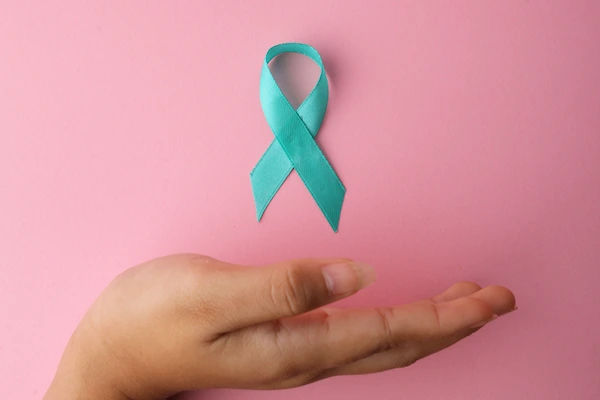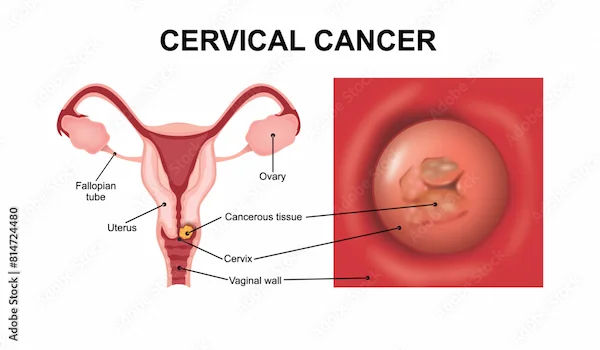Cervical Cancer Signs: Early Symptoms You Shouldn't Ignore
Don't ignore the signs of cervical cancer. Learn about the key symptoms, risk factors, and the importance of early detection to protect your health.

Written by Dr. Dhankecha Mayank Dineshbhai
Reviewed by Dr. Rohinipriyanka Pondugula MBBS
Last updated on 13th Jan, 2026

Introduction
Cervical cancer was once a leading cause of cancer death for women, but today, it's one of the most preventable gynecological cancers. The key to this dramatic shift lies in awareness, vaccination, and crucially, recognizing the early signs of cervical cancer. Often, the body sends subtle signals that something is wrong. While these symptoms can be caused by less serious conditions, they should never be ignored. This guide will walk you through the potential symptoms of cervical cancer in women, from the earliest whispers to the signs of more advanced disease. Understanding these signs empowers you to take charge of your health, seek timely medical advice, and benefit from the highly effective treatments available when caught early. Remember, knowledge is your first and best line of defense.
What is Cervical Cancer and What Causes It?
Cervical cancer occurs in the cells of the cervix, the lower, narrow end of the uterus that connects to the vagina. It doesn't develop suddenly. Instead, it's a slow process where healthy cells acquire genetic mutations that cause them to grow uncontrollably, eventually forming a tumor. These cancerous cells can invade nearby tissues and may spread (metastasize) to other parts of the body.
The Crucial Link to HPV (Human Papillomavirus)
Virtually all cases of cervical cancer are caused by a persistent infection from certain high risk strains of the Human Papillomavirus (HPV), a common sexually transmitted infection. It's important to know that HPV is extremely common, and most sexually active people will get it at some point. In most cases, the immune system clears the virus naturally without any harm. However, in a small percentage of women, the virus persists for years.
How a Persistent HPV Infection Can Lead to Cancer?
When a high-risk HPV strain doesn't go away, it can lead to the development of precancerous cells (a condition called dysplasia or Cervical Intraepithelial Neoplasia CIN). Over many years—sometimes a decade or more—these abnormal cells can gradually become cancerous if left undetected and untreated. This long precancerous window is why regular screening is so powerful; it can find these cells before they turn into cancer.
Health topic carousel:
Doctor's speciality: General Physician
Text: Consult a General Physician for the best advice
Early Stage Cervical Cancer Signs and Symptoms
The challenging aspect of early signs of cervical cancer is that they are often absent or so mild they are easily dismissed. Precancerous changes and very early stage cancers typically cause no symptoms at all. This is why relying on screening, not just symptoms, is critical. When symptoms do appear, they include:
Abnormal Vaginal Bleeding: The Most Common Red Flag
This is the most frequent and notable symptom. It’s not about your normal period but bleeding that occurs outside of your typical cycle. Be vigilant for:
- Bleeding between menstrual periods.
- Bleeding after sexual intercourse (postcoital bleeding).
- Bleeding after menopause.
- Heavier or longer-lasting menstrual bleeding than usual.
Unusual Vaginal Discharge: What to Look For
While vaginal discharge is normal, a change in its characteristics can be a signal. Pay attention to discharge that is:
- Watery, pink, or pale.
- Brownish or bloody.Foulsmelling.
- Heavier than usual.
Pain During Sex (Dyspareunia)
Pain during or after intercourse can be a symptom of cervical cancer. This is often due to the tumor being irritated or causing inflammation in the surrounding tissues.
Symptoms of Advanced or Metastatic Cervical Cancer
When cervical cancer grows larger or spreads beyond the cervix to other organs (metetastasizes), it causes more pronounced symptoms.
Pelvic and Back Pain
As the tumor enlarges, it can press on nerves and organs in the pelvis, causing a persistent, dull ache. This cervical cancer back pain is not related to your menstrual cycle and doesn't go away.
Leg Swelling and Urinary/Bowel Issues
If the cancer spreads to lymph nodes in the pelvis, it can block the flow of lymphatic fluid, leading to swelling (edema) in one or both legs—a key sign of advanced cervical cancer. A growing tumor can also press on the bladder or rectum, causing:
- Pain or difficulty urinating.
- Blood in the urine (hematuria).
- Constipation or blood in the stool.
Systemic Symptoms: Fatigue and Weight Loss
These are common in many advanced cancers. Unexplained weight loss and a profound, persistent lack of energy are signs that the body is under significant stress from the disease.
When to See a Doctor?: A Clear Guide
If you experience any of the symptoms listed above, especially abnormal vaginal bleeding, it is essential to consult a healthcare professional. Do not wait. While these signs could point to other, less serious conditions like infections or fibroids, only a doctor can provide an accurate diagnosis.
If symptoms persist beyond two weeks, consult a doctor online with Apollo24|7 for further evaluation. They can discuss your symptoms, review your history, and advise if you need an in-person examination. Early consultation is always the best course of action.
It Might Not Be Cancer: Other Possible Causes of These Symptoms
It's natural to feel anxious, but it's important to know that the symptoms of cervical cancer in women are often caused by other, more common issues:
- Abnormal Bleeding: Hormonal imbalances, polyps, fibroids, endometriosis, or a pelvic infection.
- Unusual Discharge: Yeast infections, bacterial vaginosis, or sexually transmitted infections (STIs) like trichomoniasis.
- Pelvic Pain: Menstrual cramps, ovulation pain, endometriosis, or urinary tract infections (UTIs).
A proper medical evaluation is the only way to determine the true cause.
How Cervical Cancer is Diagnosed?: The Next Steps
If your symptoms or screening results suggest an issue, your doctor will recommend tests to get a definitive answer.
The Pap Test (Smear) and HPV Test
These are screening tests, not diagnostic ones. A Pap test collects cells from your cervix to check for abnormalities. An HPV test checks for the presence of high risk HPV strains.
Apollo24|7 offers convenient home collection for tests like the HPV DNA test as part of a broader screening program, though the Pap smear itself requires a pelvic exam.
Colposcopy and Biopsy: Getting a Definitive Answer
If your screening tests are abnormal, the next step is a colposcopy. A doctor uses a special magnifying instrument (colposcope) to examine your cervix closely. If any areas look suspicious, they will take a small tissue sample (a biopsy). The biopsy is sent to a lab for analysis, which provides the only definitive diagnosis of cervical cancer.
Prevention is Your Best Defense
The good news is that cervical cancer is highly preventable.
The HPV Vaccine: Who Should Get It?
The HPV vaccine is a powerful tool that protects against the strains responsible for most cervical cancers. It is recommended for preteens (boys and girls) aged 1112 but can be given up to age 45. Talk to your doctor about vaccination.
Regular Cervical Screening Saves Lives
Screening can find precancerous changes before they become cancerous. Follow your doctor's guidelines for Pap and HPV tests. Typically, women are advised to start screening at age 21 and continue at regular intervals.
Lifestyle Factors That Can Reduce Risk
Practice safe sex using condoms to reduce HPV exposure.
Don't smoke. Smoking is linked to a higher risk of cervical cancer.
Maintain a healthy immune system through a balanced diet and exercise.
Key Takeaways
- Earlystage cervical cancer often has no symptoms, making regular screening essential.
- Abnormal vaginal bleeding (between periods, after sex, after menopause) is the most common sign.
- Other symptoms include unusual discharge, pelvic pain, pain during sex, and leg swelling.
- Cervical cancer is preventable through the HPV vaccine and regular Pap/HPV tests.
- Don't ignore symptoms. If they persist, see a doctor promptly for evaluation.
- A biopsy is the only way to confirm a diagnosis of cervical cancer.
- Knowing the signs and taking proactive steps with your health can save your life.
Consult a General Physician
Conclusion
Recognizing the potential signs of cervical cancer is a vital part of women's health. While this information can feel alarming, its purpose is to empower you, not to frighten you. Your body is intelligent, and paying attention to its signals—especially abnormal bleeding or persistent pain—is the first step. The most important message is that you have agency. Through vaccination, regular screening as recommended by your doctor, and seeking prompt medical advice for any concerning symptoms, you can dramatically reduce your risk. If your condition does not improve after trying OTC methods for infections, book a physical visit to a doctor with Apollo24|7 to get the peace of mind that comes from a professional evaluation. Your health is worth it.
Consult a General Physician

Dr. Aman Kumar
General Physician/ Internal Medicine Specialist
29 Years • MBBS, MD
Chennai
Apollo Hospitals Greams Road, Chennai
(100+ Patients)

Dr. Ramya Hari
General Practitioner
18 Years • Medical Head & Family Physician, DG Shipping Approved Doctor, Panel Physician - UK Visa Medicals
Chennai
Apollo Medical Centre Kotturpuram, Chennai
Dr. Venkatesh Billakanti
General Physician/ Internal Medicine Specialist
15 Years • M.D ( GENERAL MEDICINE), M.V.J MEDICAL COLLEGE – HOSKOTE, BANGALORE,KARNATAKA ,M.B.B.S – MEDICITY INST OF EDICAL SCIENCES – T.G , F.I.C.M – CRITICAL CARE – APOLLO JUBLI HILLS ,CCMBE – ONLINE COURSE ON ANTIBIOTIC STEWRDSHIP
Hyderabad
Apollo Hospitals Financial District, Hyderabad

Dr. Rama Narasimhan
General Physician/ Internal Medicine Specialist
20 Years • MBBS, MD
Chennai
Apollo Hospitals Greams Road, Chennai

Dr. Mohammed Sharouk Khader
General Physician/ Internal Medicine Specialist
11 Years • MBBS, Bach. of Med. & Surg., Dip. of American Board of Family Med.
Chennai
Apollo Hospitals Greams Road, Chennai
(125+ Patients)
Consult a General Physician for the best advice

Dr. Aman Kumar
General Physician/ Internal Medicine Specialist
29 Years • MBBS, MD
Chennai
Apollo Hospitals Greams Road, Chennai
(100+ Patients)

Dr. Ramya Hari
General Practitioner
18 Years • Medical Head & Family Physician, DG Shipping Approved Doctor, Panel Physician - UK Visa Medicals
Chennai
Apollo Medical Centre Kotturpuram, Chennai
Dr. Venkatesh Billakanti
General Physician/ Internal Medicine Specialist
15 Years • M.D ( GENERAL MEDICINE), M.V.J MEDICAL COLLEGE – HOSKOTE, BANGALORE,KARNATAKA ,M.B.B.S – MEDICITY INST OF EDICAL SCIENCES – T.G , F.I.C.M – CRITICAL CARE – APOLLO JUBLI HILLS ,CCMBE – ONLINE COURSE ON ANTIBIOTIC STEWRDSHIP
Hyderabad
Apollo Hospitals Financial District, Hyderabad

Dr. Rama Narasimhan
General Physician/ Internal Medicine Specialist
20 Years • MBBS, MD
Chennai
Apollo Hospitals Greams Road, Chennai

Dr. Mohammed Sharouk Khader
General Physician/ Internal Medicine Specialist
11 Years • MBBS, Bach. of Med. & Surg., Dip. of American Board of Family Med.
Chennai
Apollo Hospitals Greams Road, Chennai
(125+ Patients)
More articles from Cervical Cancer
Frequently Asked Questions
Can you have cervical cancer with no symptoms at all?
Yes, absolutely. Precancerous changes and early stage cervical cancer very often cause no noticeable symptoms. This is why following the recommended schedule for Pap smears and HPV tests is nonnegotiable for preventive health.
What does cervical cancer discharge look like?
It can vary but is often described as watery, pale, pink, or brownish and may be streaked with blood. It might also have a foul or unusual odor. However, similar discharge can be caused by infections, so a doctor's assessment is needed.
Is bleeding after sex always a sign of cancer?
No, bleeding after sex (postcoital bleeding) can be caused by many factors, including dryness, cervical polyps, or infections. However, because it is a common early sign of cervical cancer, it should never be ignored and always warrants a checkup with a gynecologist.
How quickly do symptoms of cervical cancer appear?
Cervical cancer develops very slowly over many years. Symptoms typically only appear once the precancerous changes have progressed to invasive cancer or the tumor has grown large enough to affect surrounding tissues. You may have had abnormal cells for a long time before any symptoms show.
At what age do cervical cancer symptoms typically start?
Cervical cancer is most frequently diagnosed in women between the ages of 35 and 44. However, because it's caused by a persistent HPV infection acquired years earlier, it's possible for symptoms to appear in women in their late 20s and 30s. Screening guidelines start at age 21 for this reason.

.webp)


